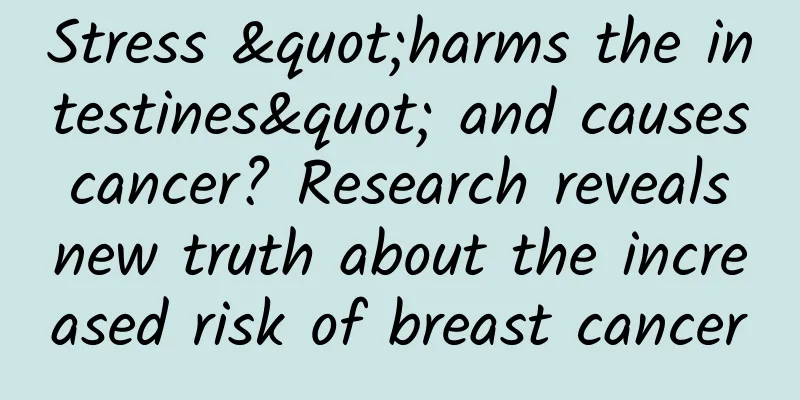Stress "harms the intestines" and causes cancer? Research reveals new truth about the increased risk of breast cancer

|
As the pace of society accelerates, psychological stress has become a common problem faced by modern people. Long-term psychological stress not only affects mental health, but is also closely related to the occurrence and development of various diseases such as cancer. However, how psychological stress promotes the occurrence and development of cancer, especially the molecular mechanism behind it, remains a mystery to be solved. Recently, a research team led by Professor Liu Qiang and Professor Peng Fei from the Dalian Medical University Cancer Stem Cell Research Institute and Professor Xu Lingzhi from the Second Affiliated Hospital of Dalian Medical University published a study in the famous journal Signal Transduction and Targeted Therapy. The study found that psychological stress has a negative impact on the intestinal flora, especially reducing the number of intestinal bacteria called Akkermansia muciniphila (Akk). This leads to a decrease in the short-chain fatty acid butyrate (a substance that is beneficial to the body), which makes breast cancer cells more likely to become bad cells that cause tumor growth, spread, resistance to drugs, and recurrence. Simply put, stress increases the risk and severity of breast cancer by affecting the bacteria in the intestines. Research process and methods In order to explore the connection between psychological stress and breast cancer, the research team designed a series of rigorous experiments. They first constructed a breast cancer mouse model and divided it into two groups: one group was treated with chronic restraint stress to simulate the state of psychological stress; the other group served as a control group and was not treated. By comparing the tumor growth, changes in intestinal flora, and related metabolite levels of the two groups of mice, the effect of psychological stress on the progression of breast cancer and its potential mechanism were explored. During the experiment, the researchers used a variety of advanced technical means. For example, through comparative experiments on germ-free mice and mice without specific pathogens, the interference of other microorganisms was eliminated, accurately revealing the role of intestinal flora in the process of psychological stress promoting cancer. Not only that, they also used high-throughput sequencing technology to analyze the microbial composition in mouse fecal samples and found that Akk bacteria were significantly reduced. Furthermore, the researchers verified the reversal effect of these interventions on psychological stress-induced tumor growth by supplementing Akk bacteria, butyrate or high-fiber food through gavage. Research Findings The study found that psychological stress significantly reduced the abundance of Akk bacteria in the intestine, which in turn led to a decrease in the content of the short-chain fatty acid butyrate. This change ultimately promoted the development of breast cancer cells into cancer stem-like cells that drive tumor occurrence, metastasis, drug resistance and recurrence. Specifically, the researchers observed in the mouse model of chronic restraint stress that the tumor volume increased significantly and the expression level of stemness factors increased abnormally (abnormal increase of stemness factors may cause cells to divide uncontrollably and form tumors). In germ-free mice, there was no significant difference in tumor size and stemness factor levels, regardless of whether they were treated with chronic restraint stress. This suggests that intestinal microorganisms play a key role in the process of psychological stress promoting cancer. Further studies have found that supplementation with Akkermansia keratinosa, butyrate or a high-fiber diet can significantly reverse psychological stress-induced tumor growth. These interventions not only inhibited tumor growth, but also reduced the expression of stemness factors in tumors. The study also revealed the mechanism by which butyrate works: butyrate inhibits the activity of histone deacetylase, promotes the expression of RNA-binding protein zinc finger protein 36, and then reduces the level of low-density lipoprotein receptor-related protein 5, inhibiting the activation of the stemness maintenance signaling pathway Wnt/β-catenin. In short, butyrate, through a series of complex biochemical events, ultimately inhibits a key signaling pathway that usually helps stem cells maintain their self-renewal ability and differentiation potential. This inhibition may have a positive effect on preventing the development of breast cancer. Outlook and cancer prevention advice This study reveals a new mechanism by which psychological stress promotes cancer, providing a new potential intervention method for the clinical treatment of cancer. In the future, the research team will further verify the applicability of this mechanism in humans and explore new strategies for cancer treatment based on intestinal flora. For the public, this study provides important health implications. We should pay attention to the management of psychological stress, learn to relieve stress in a reasonable way, and maintain mental health; at the same time, maintaining good eating habits and increasing the intake of high-fiber foods will help maintain the balance and health of the intestinal flora. For cancer patients, while following the doctor's advice for treatment, they can also consider adjusting their diet and lifestyle to assist in treatment. In short, this study not only reveals the deep connection between psychological stress and cancer, but also opens up new research paths. Looking forward to the future, as scientific exploration continues to advance, we have reason to believe that scientists will gradually unlock more precise strategies for preventing and treating cancer, thus opening a new chapter for human health. References: Cui B, Luo H, He B, et al. Gut dysbiosis conveys psychological stress to activate LRP5/β-catenin pathway promoting cancer stemness. Signal Transduction and Targeted Therapy (2025). |
<<: Menopause is a hurdle for women. Keep these in mind to make menopause more comfortable.
Recommend
Don’t worry about swallowing disorders, eat right to protect
In daily life, dysphagia is a problem that cannot...
In the hot summer, be careful about dry and sore eyes!
What does your summer look like? Watermelon! Pops...
How do 30-year-old women maintain their ovaries?
We all know the importance of health preservation...
Can I run on the second day of my period?
Menstruation is an extremely important phenomenon...
How can women get rid of the trouble of dysmenorrhea?
Dysmenorrhea is very painful for women. There are...
What should I do if my period comes a week early every time?
Some women have encountered a problem that makes ...
What is the periodic table formula? What are the first 20 elements in the periodic table?
The periodic table of chemical elements is a list...
Can bayberry be used to make wine? What can be eaten with bayberry?
The fruit of bayberry is moderately sweet and sou...
Specific location of thumb to induce menstruation
Irregular menstruation is something that every fe...
How long can a pregnant woman swim?
Many mothers have heard that they can swim after ...
Female waist to leg pain
Low back and leg pain refers to a common symptom ...
Can I eat hair algae during menstruation?
We all know that female friends should eat less b...
Is there a lot of fetal movement when there is less amniotic fluid?
Generally speaking, if there is less amniotic flu...
How serious is chronic kidney disease? Look at these 5 indicators!
Chronic kidney disease (CKD) is a common health p...
Effects of ethinyl estradiol on women
Diethylstilbestrol is a synthetic non-steroidal e...









